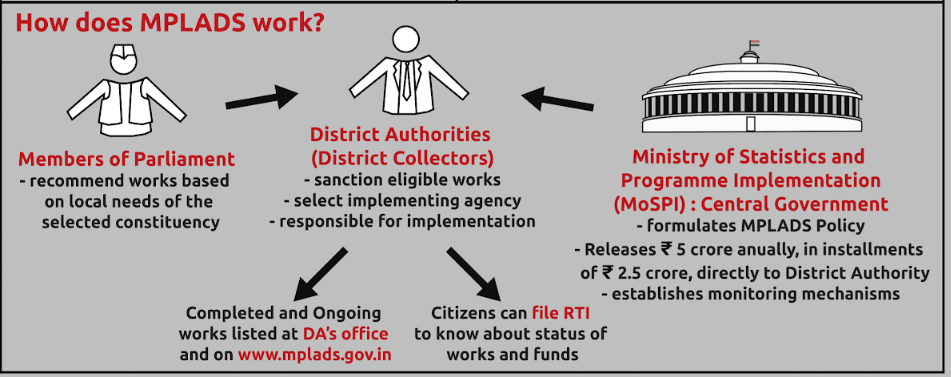Indian Polity
MPLAD Scheme
- 11 Apr 2020
- 7 min read
This article is based on “For better use: On MPLADS funds” which was published in The Hindu on 09/04/2020. It talks about issues pertaining to the Member of Parliament Local Area Development Scheme.
Recently, the Government of India in the event of struggle against Covid-19 has suspended Member of Parliament Local Area Development Scheme or MPLADS funds for two years (2020 and 2021) and directed these funds to be transferred to the Consolidated Fund of India.
The Government is seeking to garner around Rs 7,900 crores by suspending the MPLADS for two years.
The government is of view that the transfer of these sums to the Consolidated Fund of India would help judicious deployment of fund, but political opposition has criticized this move, as in their opinion the decision may undermine the decentralized manner of funding local area development.
Apart from this political tussle, the decision has revived the debate regarding the relevance of MPLAD scheme.
What is the MPLAD Scheme?
- The MPLAD scheme was formulated in 1993 to enable Members of Parliament (MPs) to recommend development works in their constituencies with emphasis on the creation of durable community assets based on the locally felt need.
- Durable assets of national priorities and community needs viz. drinking water, primary education, public health, sanitation and roads, etc.
- Initially, the Scheme was under the control of the Ministry of Rural Development and Planning. In October, 1994, the scheme was transferred to the Ministry of Statistics & Programme Implementation.
- Under this scheme,every MP is entitled to spend Rs 5 crore annually.
- Similar to MPLADS, several states have enacted schemes called Member of Legislative Assembly Local Area Development Scheme (MLALADS) where funds are given to MLAs.
- According to the ‘Guidelines on Members of Parliament Local Area Development Scheme (MPLADS)’ published by the Ministry of Statistics and Programme Implementation in June 2016, the MPLAD funds can also be used for implementation of the schemes such as Swachh Bharat Abhiyan, Accessible India Campaign (Sugamya Bharat Abhiyan), conservation of water through rain water harvesting and Sansad Aadarsh Gram Yojana, etc.
Issues Related to MPLAD Scheme
- Breach of Federalism
- Union Government can incur expenditure only with respect to matters over which it has subject domain as per seventh schedule.
- MPLADS encroaches upon the domain of local self governing institutions and thereby violates Part IX and IX-A of the Constitution.
- Conflict with Doctrine of Separation of Powers
- The Scheme disturbs the scheme of separation of powers under the Constitution, as MPs are getting involved in executive functions.
- Implementation Lapses
- MPLAD scheme gives scope for MPs to utilise the funds as a source of patronage that they can dispense at will.
- The CAG has flagged instances of financial mismanagement and artificial inflation of amounts spent.
- Also, the scheme is alleged to be marred by the nexus of MP and private firms.
- Due to this sometimes spending of MPLADS funds is seen for private works, recommending funds to ineligible agencies, diverting funds to private trusts, etc.
- No Statutory Backing
- The MPLAD Scheme is not governed by any statutory law and is subject to the whims and fancies of the government of the day.
- Some Commission Recommendations
- In 2002, the National Commission to Review the Working of the Constitution recommended immediate discontinuation of the MPLAD scheme on the ground that it was inconsistent with the spirit of federalism and distribution of powers between the centre and the state.
- Similar thing has also been taken by the 2nd Administrative Reforms Commission’s report 2007.
Constitutionality of the Scheme
Based on above arguments the MPLADS was challenged in the Supreme Court (SC) in 2010. A five-judge bench of the SC held that:
- Indian Constitution does not recognise strict separation of powers.
- Even though MPs have been given a seemingly executive function, their role is limited to ‘recommending’ works and actual implementation is done by the local authorities.
- Therefore, the scheme does not violate separation of powers
- India has a quasi-federal nature of the Constitution.
- Article 282 held that both the Union and the State have the power to make grants for a purpose irrespective of whether the subject matter of the purpose falls in the Seventh Schedule provided that the purpose is "public purpose" within the meaning of the Constitution.
- Also, the Scheme falls within the meaning of "public purpose" aiming for the fulfillment of the development and welfare of the State as reflected in the Directive Principles of State Policy.
- Also there are robust accountability mechanisms for the scheme as it comes under the RTI Act.
Way Forward
While the question of constitutionality of the MPLAD scheme may have been put to rest by the Supreme Court ruling, other issues related to implementation of the scheme still remain. These can be rectified by:
- Better transparency and monitoring of funds spent and sanctioned works.
- The scheme can be made more inclusive by including citizens for which project to be executed from MPLAD funds.
- Also, lapsable funds can put pressure on MPs for optimum utilisation and prevent build up of unutilised funds
Given the decentralized nature of the MPLAD scheme, with adequate monitoring and sufficient political will, it can work as an indispensable tool of development at the grassroot.
|
Drishti Mains Question Discuss the relevance of Member of Parliament Local Area Development Scheme in present times. |





